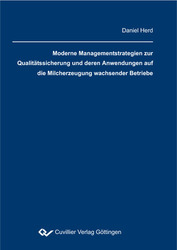| Fachbereiche | |
|---|---|
| Buchreihen (97) |
1382
|
| Nachhaltigkeit |
3
|
| Gesundheitswesen |
1
|
| Geisteswissenschaften |
2377
|
| Naturwissenschaften |
5408
|
| Mathematik | 228 |
| Informatik | 320 |
| Physik | 980 |
| Chemie | 1364 |
| Geowissenschaften | 131 |
| Humanmedizin | 243 |
| Zahn-, Mund- und Kieferheilkunde | 10 |
| Veterinärmedizin | 108 |
| Pharmazie | 147 |
| Biologie | 835 |
| Biochemie, Molekularbiologie, Gentechnologie | 121 |
| Biophysik | 25 |
| Ernährungs- und Haushaltswissenschaften | 45 |
| Land- und Agrarwissenschaften | 1005 |
| Forstwissenschaften | 201 |
| Gartenbauwissenschaft | 20 |
| Umweltforschung, Ökologie und Landespflege | 148 |
| Ingenieurwissenschaften |
1798
|
| Allgemein |
98
|
|
Leitlinien Unfallchirurgie
5. Auflage bestellen |
|
Erweiterte Suche
Moderne Managementstrategien zur Qualitätssicherung und deren Anwendung auf die Milcherzeugung wachsender Betriebe
Daniel Herd (Autor)Vorschau
Inhaltsverzeichnis, Datei (21 KB)
Leseprobe, Datei (210 KB)
Due to low prices for raw products the structural change in the agricultural sector has continued during the last few years.
For most dairies full production costs are higher than their income; only top managed farms have enough revenues to stay profitable.
A series of crises concerning human food and animal feed have caused changes in the general European principles of food law.
Thereupon procedures relating to food safety have been applied to animal nutrition. The traceability of food, feed and food-producing animals through all stages of production, processing and distribution is the goal of the new regulations.
This important modification started with the White Paper on food safety and was followed by the Regulation (EC) No 178/2002.
This document lays down the general principles and requirements of food law, establishing the European Food Safety Authority, laying down procedures in matters of food safety, concerning protection of human life, health and consumers’ interests, with regard to the protection of animal health and welfare, plant health and the environment.
These European regulations have to convert into German law within a certain time frame. In the future they will have much more influence on our legislation to get a uniform European food law. Many companies in the food business have already implemented quality systems to ensure product safety and to reduce product liability.
Meanwhile they increasingly demand similar systems from their suppliers of agricultural raw materials. According to the Regulation (EC) No 178/2002 farmers are food and feed business operators.
Therefore product and production records concerning quality have to be documented.
In the experimental part of this paper a work study in 6 dairies was presented, which showed that in modern dairy farms the premises for high quality production exceed the expectations. The analysed milking routines cover all aspects of economy, ecology, animal physiology, ergonomics and technique. Milk has to be checked by law many times per month on different parameters, such as butter fat, protein, or somatic cell count.
These records are set values for product documentation. Although technical standards are high only few data are systematically monitored throughout the production process.
The economical success and profitability of the agricultural production is dominated by severe changes in law such as the Regulation (EC) No 178/2002 laying down general principles for food safety, the Regulation (EC) No 1782/2003 – Cross Compliance and the upcoming review of the application of hazard analysis and critical control point (HACCP) principles to primary production.
Besides these restraints retailers and food business operators claim certain quality standards or systems from their suppliers.
Hence, farmers have to focus on standardization of production and work process, such as the implementation of standard operating procedures like milking routines and the systematic documentation of all activities concerning product und process quality.
| ISBN-13 (Printausgabe) | 386727052X |
| ISBN-13 (Printausgabe) | 9783867270526 |
| ISBN-13 (E-Book) | 9783736920521 |
| Buchendformat | A5 |
| Sprache | Deutsch |
| Seitenanzahl | 284 |
| Umschlagkaschierung | glänzend |
| Auflage | 1 |
| Band | 0 |
| Erscheinungsort | Göttingen |
| Promotionsort | Gießen |
| Erscheinungsdatum | 13.11.2006 |
| Allgemeine Einordnung | Dissertation |
| Fachbereiche |
Land- und Agrarwissenschaften
|








